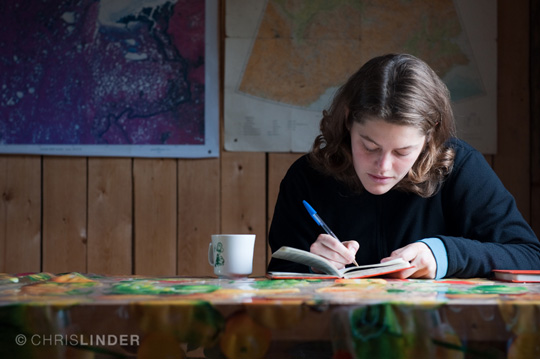Field Notes
During, before, and after the field course, Polaris students and faculty share their thoughts through journal entries.

During, before, and after the field course, Polaris students and faculty share their thoughts through journal entries.

It’s been a week of rapid change here in Cherskiy. The “inter-niet” has switched to “inter-da”, tropical heat has replaced arctic snow and, for the first time ever, facial hair has appeared on the right side of my face.
Continue readingOver the last few days, I have had the opportunity to accompany Dr. Valentin Spektor of the Melnikov Permafrost Institute in Yakutsk, Russia, and Dr. Alexander (Sasha) Kholodov of the University of Alaska at Fairbanks as they use their drilling equipment to bore into the ground and collect permafrost core
Continue readingWhat do you expect when you are going to Siberia to work with world-class scientists? I had high expectations just like my fellow students. But what I have experienced on this journey thus far is far beyond my wildest dreams.
Continue readingAs part of my NSF-Funded Post-Doctoral Fellowship, I have spent the last year talking with colleagues and friends to try and determine the best approach for conducting plot-level experimental burns in the larch forests of far northeastern Siberia. Today, all that planning and strategizing finally paid off.
Continue reading“Nyet” is the Russian word for “No” or “None.” Over the last few days, we have had only “inter-nyet,” – although not technically a Russian or English word, its meaning is clear. Thus, we have been out of touch in terms of posting blogs or looking at email.
Continue readingIn these first five days we have managed to collect almost 1,000 lbs of twigs, branches, and logs. Then we dried all of them. Then we weighed all of them. Then we prepared our plots, which included clearing all of the plants on and around them, fluffing the moss so
Continue readingTime is flying by in Cherskiy! I'm making progress on my project, but will I finish in time?
Continue readingBurn day. Our anticipation has been fueled (literally) by expectations, curiosities, and uncertainties of conducting experimental burns here at the Northeast Science Station.
Continue readingI’m running an experiment which seeps the organic carbon from different vegetation to determine (in so many words) bacteria's ability to consume that organic material (the lability of the carbon).
Continue readingI thought for sure that I would lose a few pounds roughing it in extreme northern Siberia. You know – competing with bears for available game or fishing by hand in the rivers… I was wrong. Very, very wrong!
Continue readingThis morning, Dr. Heather Alexander’s team conducted their first experimental burns to test the effect of burn severity on the regrowth of the larch forests and on the consequent implications on permafrost soils.
Continue readingYou may ask yourself, “What is moss fluffing?” Today, Dr. Heather Alexander of the University of Texas at Brownsville, may have created the newest term in field science.
Continue readingThey tried to prepare us. Bug shirts and bug spray were on the packing list as necessary items. The Polaris website has pictures and video of the swarming masses. But no matter what someone tells you, it is not the same as being out in it.
Continue readingToday we took the inflatable boat out on Such'ye Lake, which is about a kilometer from the station. First part of the day was spent taking optical measurements using the BIC, then taking various readings with the CTD and YSI such as temperature, depth, conductivity, pressure, pH, and dissolved oxygen.
Continue readingSo what happens if you fill a plastic bottle with air on the 14,265-foot summit of a Colorado mountain and bring it down to sea level in Cherskiy, Siberia? This is the experiment proposed by my students in Colorado that I wrote about in my June 19th journal on the
Continue reading